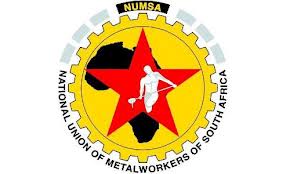More than 220 000 Numsa workers in the metal and engineering industries have downed tools today as part of an indefinite strike.
Numsa members in Gauteng will today march to the Metal and Engineering Industries Bargaining Council where they will be addressed by Numsa President Andrew Chirwa and COSATU General Secretary Zwelinzima Vavi. Marches will take place across the country to mark the start of the strike. The union is demanding a one year agreement with a 12% wage increase and a total ban on labour brokers. They also want a 5:1 ratio for apprentices to artisans, guaranteed employment for apprentices, 100% payment for training and a ban on the implementation of the Employment Tax Incentive in the industry. Wage negotiations in the metals and engineering sector reached a deadlock following three months of negotiations without a settlement. Trade unions rejected a three-year wage settlement offer including a 7% all-inclusive, cost-of-employment increase in 2014 tabled by the Steel and Engineering Industries Federation of Southern Africa (SEIFSA). Meanwhile COSATU has backed Numsa, calling upon all its affiliates to give the strike their full support and to be ready to mobilise solidarity action should a settlement not be reached. “Workers withdrawal of labour in a wage dispute is the only weapon they have,” the union said in a statement. “When the multi-term wage agreements results in no strikes for the specified period then who is to blame for the economies slowing down internationally and locally?” However Numsa general secretary Irvin Jim has said the strike is not economic sabotage but a campaign for a living wage. Economists predict that the strike will be a major setback for the country’s economy as it recovers from a five-month long strike in the platinum mining sector. With three times the number of striking workers who took part in the platinum strike, this strike is expected to have potentially crippling effects on the production of iron and steel as well as the manufacturing and automotive sectors. Lock-out SEIFSA affiliated employer associations have issued a lock-out notice to all unions in the metal and engineering sector in response to the strike. SEIFSA has withdrawn its lock-out notice to Solidarity who has fought to let non-striking workers keep operations fully or partly running as the strike and negotiations continue. SEIFSA Chief Executive Officer Kaizer Nyatsumba said that he appreciated the fact that Solidarity was sufficiently concerned about the poor state of the economy, including the ailing metals and engineering industries. He expressed the hope that the other unions, which have all given notice to go on strike, could also be persuaded to forego the strike or to end it as soon as possible. Solidarity General Secretary Gideon du Plessis has applauded the National Employers Association of South Africa (Neasa) which will only lock out striking workers from its members’ workplaces.Heavy criticism from employers
Meanwhile, Neasa Chief Executive Gerhard Papenfus has heavily criticised NUMSA, calling the strike premature and irresponsible. He believes the trade union has jumped the gun by walking away from the negotiations without entertaining any of the issues that NEASA deems of national importance such as job creation and the establishment of more flexible measures to help with the creation of jobs. “The decision by NUMSA clearly shows that they are not serious about growing the economy, job creation, creating an environment that will at least attempt to accommodate millions of unemployed and that they clearly do not understand the crucial role that small and medium enterprises play in growing the economy,” he said. “They clearly do not understand that this strike will not only lead to the loss of production and the income stability of NUMSA workers, but also affect South Africa’s image as a reliant investment destination.” NEASA is calling upon NUMSA and all other unions to exercise their right to strike within the confines of the law and not to engage in acts of violence and intimidation against businesses who attempt to continue production andthose workers who do not take part in the strike. Nyatsumba has indicated that SEIFSA is available for one-on-one meetings with role players and other interested parties with a view to ending the strike just as it is beginning. “Our economy has been seriously under-performing over the past few years and the situation has been worsening in recent times. The last thing that we need is a strike,” he said. Strike could affect Eskom Members of Numsa working in the engineering and steel sector at the Medupi and Kuslie power stations are now also expected to join the nationwide strike in addition to Eskom employees. Eskom has warned employed that they will face disciplinary action if they take part in the strike. The power utility’s spokesperson Andrew Etzinger told The Citizen that it is not legal for employees to embark on a strike action as the company was declared an essential service. He said Eskom has contingency plans in place but could not elaborate on them.






